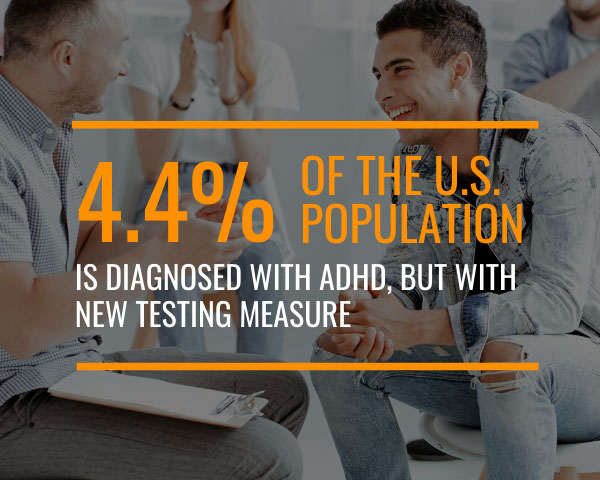
Attention deficit hyperactive disorder, commonly known as ADHD, is one of the most common mental illnesses in the USA. Some 4.4% of the U.S. population is diagnosed with ADHD, but with new testing measures, 5.9-7% of persons under the age of 17 have been diagnosed. While early measures do a great deal to reduce the effects of ADHD, some 2-5% of adults retain the disorder throughout their lives. Many have also remained undiagnosed, and only receive recognition and treatment well into adulthood.
Attention Deficit Hyperactivity Disorder affects behavior, learning, social life, relationships, and focus. This can reduce learning ability, career potential, and the ability of an individual to lead a fulfilling life. While Attention Deficit Disorder in adults is a chronic condition, it will be with you for the rest of your life, ADHD treatment aims to mitigate symptoms, teach coping mechanisms, and help the individual to improve quality of life.
Attention Deficit Hyperactivity Disorder Symptoms
Attention Deficit Hyperactivity Disorder is primarily defined under 3 subtypes, each of which have different symptoms. In most cases, symptoms are divided into two groups, “Hyperactivity” and “attention deficit”.
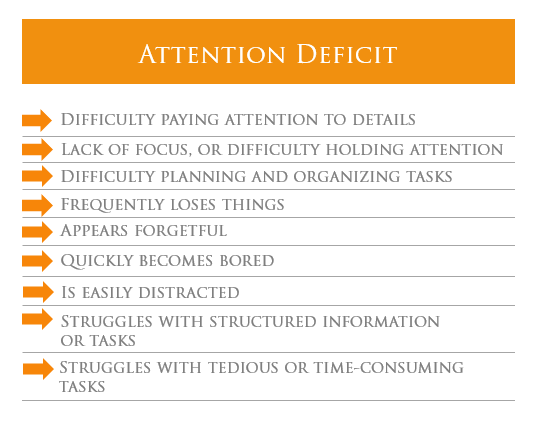
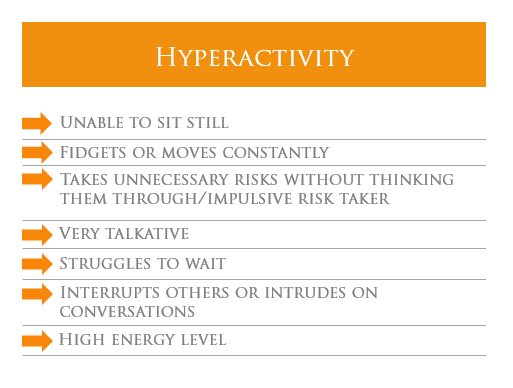
These symptoms impact different people to different levels.
ADHD Subtypes
There are three primary subtypes of ADHD. Subtypes refer to the expression of Attention Deficit Hyperactivity Disorder, based on which symptoms are present or most prominent.
What does this mean in practice? A person may have ADHD and show almost no issues with hyperactivity. Or vice versa.
Diagnosing ADHD
The Diagnostic and Statistical Manual of Mental Disorders, Fifth Edition (DSM-5) defines ADHD when:

While there is some question as to the age in which ADHD first begins to manifest, most experts agree that ADHD is a lifelong disorder. It does not spontaneously manifest in adults. Many people develop significant coping mechanisms and can manage for years. However, this leads to increased risks of developing co-occurring disorders, substance use disorders, and problems with work and social relationships.
Diagnosing attention deficit hyperactivity disorder will always include a thorough review of the patient’s history, a blood test, psychological testing, and a physical exam.
ADHD and Dual Diagnosis
Individuals with Attention Deficit Hyperactivity Disorder are high-risk for developing co-occurring disorders. In fact, some data shows comorbidity to be as high as 60% in adult patients.
Substance Use Disorders
Adults with ADHD are at a high risk of developing substance use disorders, likely because substances are used as a coping mechanism, ADHD results in impulsive risk-taking, and individuals with ADHD are not well-suited to quitting a substance, which requires vast amounts of focus.
Mood Disorders
Adults with ADHD are very prone to depression, bipolar disorder, and other mood disorders. The correlation is complex, with data suggesting that factors resulting in ADHD also result in other disorders, but problems caused by ADHD can exacerbate those disorders.
Anxiety Disorders
Many people with ADHD struggle with anxiety, worry, nervousness, and even panic attacks. This can be exacerbated by problems caused by ADHD.
Treatment for Attention Deficit Hyperactivity Disorder
ADHD is primarily treated using medication and psychotherapy. Depending on the case, you may be recommended to psychotherapy first, followed by medication in case of poor improvement or medication first, to be followed by psychotherapy. In most cases, a complete ADHD treatment plan will include education, therapy, medication, and involving family, so that they can offer support.
Many people with ADHD also benefit from assessing and treating any comorbid conditions, which may be treated separately, or alongside the ADHD diagnosis.
Medication for ADHD
ADHD is treated using either stimulant or non-stimulant medications. While stimulants have been the drug of choice for ADHD for most of history, doctors today recognize that these drugs are addictive and short acting, meaning it is difficult for a person with ADHD to successfully pace medication, use it to improve their life long-term, and continue to use it in a healthy way. Therefore, stimulant medications are typically issued with strong Risk Evaluation and Management Strategies (REMS) in place.
Common stimulants Include:
Common non-stimulant medications include:
Psychotherapy and Counseling for ADHD
Psychotherapy, including cognitive behavioral therapy, behavioral therapy, family therapy, motivational therapy, social skills training, behavioral peer intervention, and organization training, is considered a first line treatment for attention deficit hyperactive disorder. Additional counseling and therapy including life coaching, job coaching, stress management, project management, and personal organization are also immensely helpful for persons with ADHD.
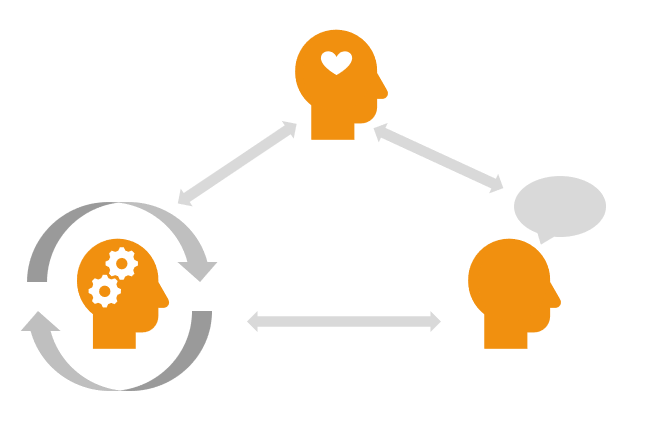 Cognitive Behavioral Therapy – Cognitive Behavioral Therapy helps individuals tackle thoughts, behavior, motivation, and responses to situations. In most cases, the goal is to improve self-esteem, create healthy behavior and coping mechanisms around focus and task completion, and to build actionable skills and goals.
Cognitive Behavioral Therapy – Cognitive Behavioral Therapy helps individuals tackle thoughts, behavior, motivation, and responses to situations. In most cases, the goal is to improve self-esteem, create healthy behavior and coping mechanisms around focus and task completion, and to build actionable skills and goals.
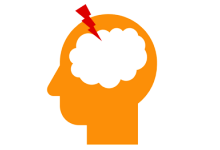 Stress Management – Stress management is aimed at reducing stress while improving coping mechanisms for stress and anxiety. This may include stress management training and holistic approaches such as mindfulness.
Stress Management – Stress management is aimed at reducing stress while improving coping mechanisms for stress and anxiety. This may include stress management training and holistic approaches such as mindfulness.
 Life Coaching – Job coaching, life coaching, and skills training are considered essential treatment for ADHD. Here, you learn to set goals, organize in the home and at work, build relationships, and to organize tasks and goals in ways that are achievable for you.
Life Coaching – Job coaching, life coaching, and skills training are considered essential treatment for ADHD. Here, you learn to set goals, organize in the home and at work, build relationships, and to organize tasks and goals in ways that are achievable for you.

Family Therapy and Education – It’s critical to learn about ADHD and how it works. It’s also important that your family learn about both. Understanding is the first step to management, to setting goals you can work with, and to providing an environment where you can thrive. Here, family therapy revolves around family education and building or rebuilding relationships.
ADHD Treatment Centers

ADHD Treatment Centers offer intensive programs complete with therapy and counseling, intended to help individuals mitigate and reduce the symptoms of ADHD. In some cases, treatment centers will offer prescription medication alongside cognitive behavioral and motivational therapy. In other cases, they will use a “therapy first” approach.
Most treatment centers offer inpatient and outpatient settings, where you can choose to attend therapy from your own home while going to work or school, or from a residential center, where you live with a group of peers for 30-90 days, away from stress and triggers of daily life.
ADHD treatment is intended to help individuals regain some control over their life and symptoms, so that they can manage their goals, relationships, responsibilities, and work. No treatment is intended as a cure for ADHD, but with treatment, you can expect to cope with problems, to manage them better, and to mitigate their effects on your daily life.